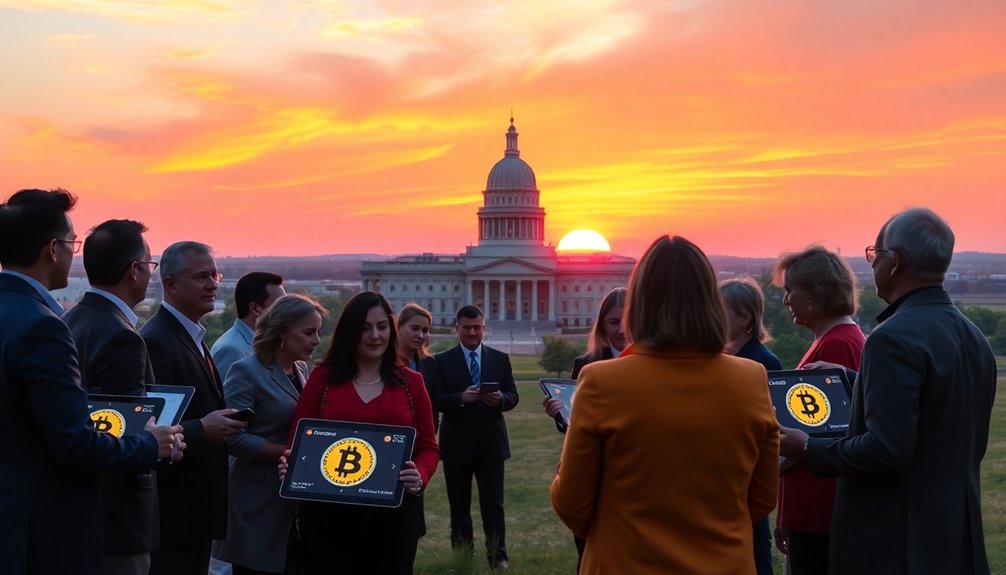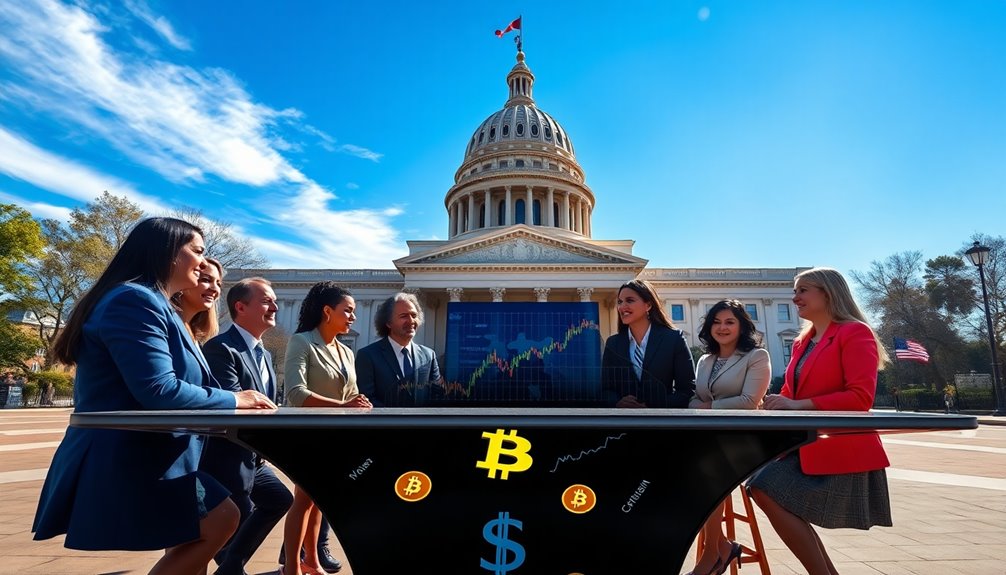Oklahoma's pushing the Bitcoin Reserve Act to boost its economy and ensure financial resilience. The proposal lets state funds invest up to 10% in Bitcoin and other major digital assets, showing a modern approach to managing state resources. This move aligns with efforts to diversify the economy while securing long-term fiscal stability. With the upcoming legislative session on February 3, key decisions will be made about Oklahoma's financial future. You'll discover how these measures could reshape the state's economic landscape and what it means for residents as they navigate this exciting shift.
Key Takeaways
- Oklahoma's proposal allows state funds to invest up to 10% in Bitcoin, enhancing financial stability against inflation.
- The state aims to diversify its economy through innovative financial strategies, including the Bitcoin Strategic Reserve.
- Legislative support from groups like the Satoshi Action Fund aligns with President Trump's vision for financial resilience.
- The upcoming session on February 3, 2025, will discuss the implications of establishing a digital investment framework.
- Oklahoma's strong credit ratings and robust reserves position it well for adopting Bitcoin investments.
Oklahoma's Economic Resilience Strategy

As Oklahoma navigates economic challenges, its Economic Resilience Strategy stands out as a proactive approach to ensure stability and growth.
You'll notice the state's strong credit ratings, like the Aa1 from Moody's, reflecting its solid economy. With minimal debt and robust reserves, Oklahoma showcases prudent fiscal management, recognized by top credit rating agencies. This disciplined governance is expected to enhance credit ratings further, securing long-term financial success for future generations.
Additionally, Oklahoma emphasizes economic diversification through funding specialty crop development and enhancing agriculture. These initiatives not only promote rural growth but also create healthy food access in underserved areas, fostering a resilient economy that can withstand fluctuations and thrive in the coming years. The proposed Bitcoin Strategic Reserve of up to $850 million further signals Oklahoma's commitment to innovative financial strategies.
Legislative Bitcoin Reserve Proposal

Recognizing the evolving landscape of digital finance, Oklahoma has introduced the Legislative Bitcoin Reserve Proposal, a forward-thinking initiative designed to allow state savings accounts and pension funds to invest in Bitcoin.
This proposal caps investments at 10% of total fund values and includes other digital assets with market capitalizations over $500 billion, such as stablecoins. It also permits staking and requires regulatory approval from recognized entities for stablecoin investments. By aligning with President Trump's vision for financial stability, this initiative underscores Bitcoin's decentralized nature as a hedge against inflation. If passed, it could significantly influence Oklahoma's fiscal policy and secure a stronger financial future for the state's economy. The proposal aims to position Oklahoma as a leader in innovative fiscal policy and reflects a growing recognition of Bitcoin's role in financial stability.
The upcoming legislative session starting February 3 will consider this bold step forward.
Bitcoin Price Volatility Analysis

Understanding Bitcoin's price volatility requires examining several interconnected factors that drive its erratic movements. The fixed supply of 21 million coins means that fluctuations in demand can lead to significant price swings.
Regulatory changes, like bans or approvals, can trigger sharp price reactions. Investor sentiment and speculative trading are also crucial; low-priced cryptocurrencies tend to be more volatile. Interestingly, Bitcoin's historical volatility has trended downward, often preceding substantial price increases, with trends indicating that it has recently averaged lower volatility than 33 S&P 500 stocks.
Global economic events, such as interest rate hikes, further influence Bitcoin's price, making it a unique asset during economic stress. As you navigate the market, keep these factors in mind to better understand the volatility that characterizes Bitcoin.
Bitcoin Integration in Financial Institutions

While many financial institutions once hesitated to embrace Bitcoin and blockchain technology, they're now increasingly recognizing the transformative potential these innovations hold.
Major banks like Citigroup and JPMorgan have gradually adapted, integrating blockchain for cross-border payments and trade finance. This shift helps them reduce transaction turnaround times and costs significantly. Furthermore, the tokenization of assets enhances transparency and liquidity, which can further drive operational efficiency.
Blockchain's ability to eliminate intermediaries allows transactions to settle in seconds rather than days, leading to lower fees and enhanced operational efficiency.
As regulatory frameworks evolve, institutions are investing in secure custody solutions for digital assets.
Legislative Lobbying Efforts Intensify

As Oklahoma positions itself at the forefront of the digital asset movement, legislative lobbying efforts are gaining momentum to support the Strategic Bitcoin Reserve Act.
Representative Cody Maynard's introduction of House Bill 1203 aims to allow state funds to invest in Bitcoin and other digital assets. The Satoshi Action Fund's Dennis Porter is actively aiding these legislative efforts, aligning with President Trump's vision for financial stability through digital assets. Additionally, this bill marks Oklahoma as the 6th state pursuing Bitcoin reserve policies, reinforcing its commitment to innovative fiscal practices. This legislative push comes amidst a broader trend where new Bitcoin holders now control 50% of the supply, reflecting strong market demand.
As the upcoming legislative session approaches on February 3, 2025, Oklahoma seeks to establish a financial framework that incorporates digital investments, capping them at 10% of total funds.
This initiative indicates a proactive approach to safeguarding the state's economy against inflation while preparing for a digitally integrated future.
Long-term Bitcoin Adoption Trends

With Oklahoma's push for digital asset legislation, the broader landscape of Bitcoin adoption is evolving rapidly. You're witnessing a surge in institutional investment, with analysts predicting spot Bitcoin ETFs will hold 7% of the total supply by 2025. This momentum is fueled by strong inflows, potentially reaching $190 billion in assets under management. As more individuals and institutions adopt Bitcoin, its value as a medium of exchange grows, enhancing financial inclusion worldwide. Additionally, Bitcoin's scarcity and decentralized nature make it a hedge against inflation and economic instability. Oklahoma's initiative aims to protect purchasing power against inflation, further solidifying Bitcoin's role in financial strategies. Furthermore, the potential for tax advantages with Bitcoin IRAs may encourage more investors to consider it as part of their retirement planning. Countries like El Salvador lead the way, showcasing Bitcoin's potential as a national currency. Embracing Bitcoin today could mean benefiting significantly in the future.
Frequently Asked Questions
How Will the Bitcoin Reserve Act Affect Local Businesses in Oklahoma?
The Bitcoin Reserve Act can significantly impact your local business by providing economic stability and reducing inflation risks.
You'll gain financial flexibility by accepting Bitcoin payments, appealing to a broader customer base.
The act also offers regulatory clarity, ensuring secure storage and compliance with laws.
What Are the Risks of Investing in Bitcoin for the State?
You might think investing in Bitcoin is a surefire way to boost your state's economy, but it comes with significant risks.
Price volatility can lead to sudden losses, and security threats like hacking can threaten your investments.
Regulatory uncertainty adds another layer of complexity, making it tough to navigate tax implications and compliance.
Plus, the environmental impact of Bitcoin mining raises ethical concerns, potentially affecting public perception and support for such initiatives.
Can Individuals Benefit From the Bitcoin Reserve Act?
Yes, you can benefit from the Bitcoin Reserve Act. It allows state pension funds to invest in Bitcoin, potentially increasing your retirement savings through diversification.
The act also provides a regulatory framework, making investments more secure. You could enjoy tax savings since taxes paid in Bitcoin get reimbursed in US dollars.
Plus, the inclusion of stablecoins and altcoins opens up even more investment opportunities, giving you a chance for greater financial growth.
How Does Oklahoma's Bitcoin Strategy Compare to Other States?
When it comes to Bitcoin strategies, Oklahoma's making waves.
You'll find that Oklahoma stands out by allowing a 10% fund allocation into digital assets and requiring a hefty $500 billion market cap.
While other states, like Texas and Pennsylvania, don't specify limits or requirements, Oklahoma emphasizes secure storage with advanced measures.
Additionally, it allows for staking and taxes paid in Bitcoin, giving it a unique edge in the crypto landscape.
What Are the Potential Tax Implications of the Bitcoin Reserve Act?
The potential tax implications of the Bitcoin Reserve Act include exemptions from state money transmitters licenses for firms focused on digital assets, which could lower regulatory costs for you.
The Oklahoma Tax Commission will provide guidance on the tax treatment of Bitcoin payments by January 1, 2026, ensuring you understand how market value affects transactions.
However, remember that federal tax implications remain unchanged, impacting your overall tax liability.
Conclusion
As Oklahoma pushes forward with the Bitcoin Reserve Act, it's clear that the state aims to bolster its economic resilience in an ever-changing financial landscape. By embracing this digital currency, Oklahoma not only diversifies its assets but also positions itself as a forward-thinking leader. Remember, "fortune favors the bold." By taking this initiative, you're not just protecting the economy but also paving the way for a future where innovation and tradition can thrive together.









